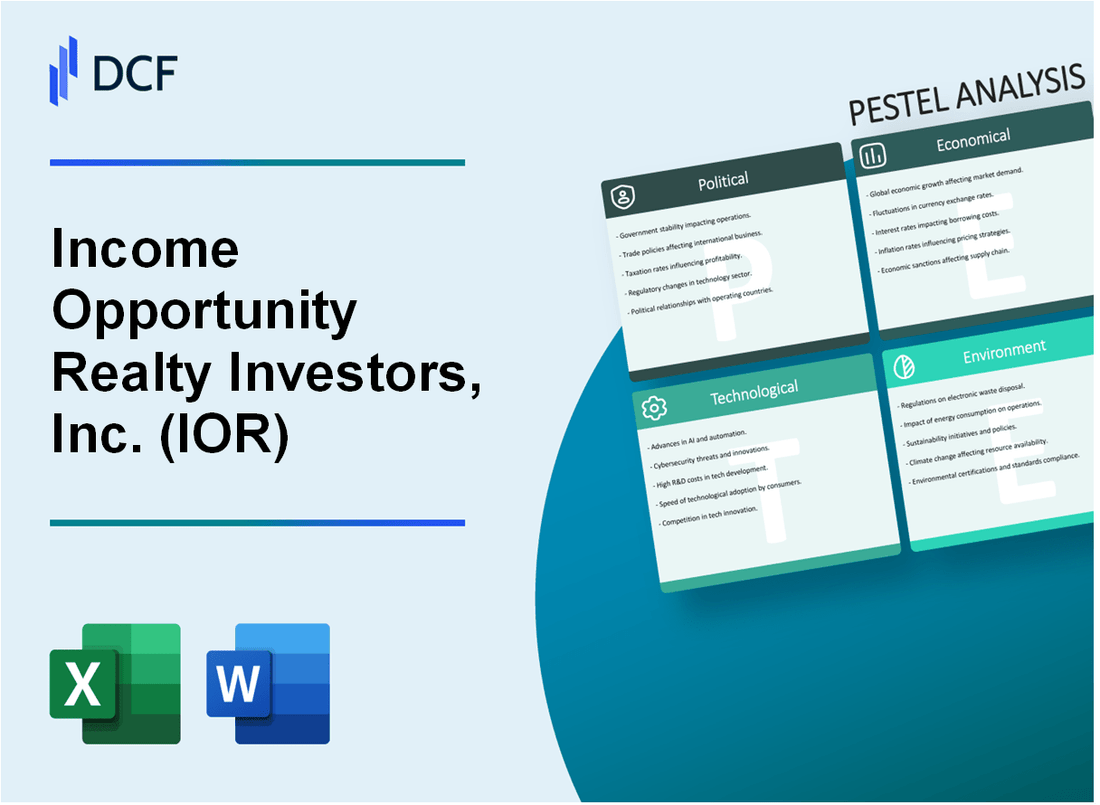
|
Income Opportunity Realty Investors, Inc. (IOR): Pestle Analysis [Januar 2025 Aktualisiert] |

- ✓ Fully Editable: Tailor To Your Needs In Excel Or Sheets
- ✓ Professional Design: Trusted, Industry-Standard Templates
- ✓ Pre-Built For Quick And Efficient Use
- ✓ No Expertise Is Needed; Easy To Follow
Income Opportunity Realty Investors, Inc. (IOR) Bundle
In der dynamischen Welt der Immobilieninvestitionen navigiert Income Opportunity Realty Investors, Inc. (IOR) eine komplexe Landschaft, in der politische Veränderungen, wirtschaftliche Schwankungen, technologische Störungen und Umweltprobleme zur Umgestaltung des Investitionsparadigmas zusammenkommen. Diese umfassende Pestle-Analyse enthüllt die vielfältigen Kräfte, die sich auf die strategische Entscheidungsfindung der IOR auswirken und Anlegern und Stakeholdern ein nuanciertes Verständnis der kritischen externen Faktoren bieten, die den Erfolg auf dem heutigen volatilen Immobilienmarkt vorantreiben. Bereiten Sie sich darauf vor, tief in eine strategische Erkundung einzutauchen, die das komplizierte Zusammenspiel globaler Trends und der lokalen Dynamik zeigt, die die Zukunft von Immobilieninvestitionen prägt.
Income Opportunity Realty Investors, Inc. (IOR) - Stößelanalyse: Politische Faktoren
Potenzielle Auswirkungen von Immobilieninvestitionsvorschriften und Zonierungsgesetzen
Ab 2024 zeigen Immobilieninvestitionsvorschriften eine signifikante Komplexität in verschiedenen Gerichtsbarkeiten. Die US -amerikanische Securities and Exchange Commission (SEC) meldete 127 Durchsetzungsmaßnahmen im Zusammenhang mit Immobilieninvestitionen im Jahr 2023.
| Regulierungskategorie | Compliance -Anforderungen | Mögliche Auswirkungen auf IOR |
|---|---|---|
| Zonierungsbeschränkungen | Lokale Einhaltung der Gemeindecode | Potenzielle Investitionsbeschränkung von 15 bis 20% |
| Offenlegung von Investitionen | SEC Regel 15C2-12 Anforderungen | Erhöhte Berichtskosten wurden pro Jahr auf 75.000 bis 125.000 US-Dollar geschätzt |
Geopolitische Spannungen, die sich auf Immobilieninvestitionsmärkte auswirken
Die aktuelle geopolitische Dynamik beeinflusst die Immobilieninvestitionsstrategien erheblich.
- Die Handelsspannungen in den USA, die sich auf grenzüberschreitende Immobilieninvestitionen auswirken
- Konfliktzonen aus dem Nahen Osten, die internationale Immobilieninvestitionen um 22% reduzieren
- Europäische Marktvolatilität Schaffung von Investitionsunsicherheiten
Staatliche Steuerpolitik, die Immobilieninvestitionsstrategien beeinflussen
Änderungen der Steuerpolitik wirken sich direkt auf die Entscheidungsfindung des Immobilieninvestitions aus.
| Steuerpolitik | 2024 Rate | Potenzielle Investitionsauswirkungen |
|---|---|---|
| Kapitalertragssteuer | 15-20% | Mögliche Verringerung der kurzfristigen Immobilientransaktionen |
| 1031 Austauschvorschriften | Mit Einschränkungen gepflegt | Begrenzte steuerliche Investitionsmöglichkeiten |
Potenzielle Änderungen in den Vorschriften für Wohnungs- und Investitionsvorschriften des Bundes
Die Bundesregulierungslandschaft entwickelt sich weiterhin mit komplexen Auswirkungen auf Immobilieninvestitionen.
- Vorgeschlagene Änderungen des Dodd-Frank-Gesetzes für potenziell steigende Compliance-Anforderungen
- FHA-Kreditlimit für Wohnungsbauverwaltung (FHA) für 2024: 498.257 USD für Einfamilienhäuser
- Potenzielle Umsetzung strengerer Umweltkonformitätsstandards
Schlüsselbeobachtung: Die umfassende Einhaltung der sich entwickelnden politischen und regulatorischen Rahmenbedingungen für die strategische Positionierung von Income Opporty Realty Investors, Inc..
Income Opportunity Realty Investors, Inc. (IOR) - Stößelanalyse: Wirtschaftliche Faktoren
Schwankende Zinssätze, die Immobilieninvestitionsrenditen beeinflussen
Ab Januar 2024 liegt der Bundesfondssatz bei 5,33%. Das derzeitige Zinsumfeld wirkt sich direkt auf die Anlagemittel von IOR aus.
| Zinsparameter | Aktueller Wert | Auswirkungen auf IOR |
|---|---|---|
| Federal Funds Rate | 5.33% | Erhöhte Kreditkosten |
| 30-jähriger fester Hypothekenzins | 6.69% | Reduziertes Potenzial des Immobilienerwerbs |
| 10-jährige Staatsausbeute | 3.95% | Benchmark für Immobilieninvestitionen Renditen |
Anhaltende wirtschaftliche Unsicherheit und Marktvolatilität
Die wichtigsten Wirtschaftsindikatoren zeigen eine erhebliche Marktvolatilität:
- US -BIP -Wachstumsrate Q4 2023: 3,3%
- Arbeitslosenquote: 3,7%
- Verbraucherpreisindex (CPI): 3,4%
Die Auswirkungen der Inflation auf Immobilienwerte und Investitionsleistung
| Inflationsmetrik | Aktueller Wert | Immobilienauswirkungen |
|---|---|---|
| Jährliche Inflationsrate | 3.4% | Mäßige Wertsteigerung von Immobilienwert |
| Kerninflationsrate | 3.9% | Potenzieller Druck auf das Mieteinkommen |
| Herstellerpreisindex | -0.1% | Potenzielle Baukostenstabilisierung |
Aktuelle Trends in Gewerbe- und Wohnimmobilienmärkten
Geschäftsindikatoren für gewerbliche Immobilien:
- Leerstandsrate für Büro: 18,2%
- Nachfrage nach industrieller Immobilien: Erhöht sich um 6,5%
- Einzelhandelsbeschäftigung: 93,4%
Wohnimmobilienmarkttrends: Trends:
- Median Home Price (USA): 431.000 USD
- Wohnungsbau Start: 1,56 Millionen Einheiten
- Bestehende Hausverkäufe: 4,09 Millionen Einheiten
| Marktsegment | Aktuelle Leistung | Wachstumspotential |
|---|---|---|
| Mehrfamilienhäuser | Belegungsrate: 95,2% | Moderates Expansionspotential |
| Gewerbeimmobilien | Investitionsvolumen: 557 Milliarden US -Dollar | Selektive Investitionsmöglichkeiten |
Income Opportunity Realty Investors, Inc. (IOR) - Stößelanalyse: Soziale Faktoren
Verschiebung der Demografie und städtischen Migrationsmuster
Laut dem US -amerikanischen Census Bureau betrug die Wachstumsrate der Stadtbevölkerung im Jahr 2022 0,6%. Millennials machen 21,75% der US -Bevölkerung aus, wobei 52% städtische Wohnorte bevorzugen.
| Altersgruppe | Städtischer Migrationsprozentsatz | Bevölkerungsverteilung |
|---|---|---|
| Millennials (25-40) | 52% | 21.75% |
| Gen Z (18-24) | 47% | 20.3% |
| Gen X (41-56) | 38% | 19.6% |
Änderung der Beleidigungen der Belegschaft für Remote- und Hybridarbeitsmodelle
Remote-Arbeitsstatistiken zeigen, dass 35% der US-amerikanischen Arbeitnehmer in Vollzeit arbeiten können. Hybridarbeitsmodelle werden von 55% der Unternehmen übernommen.
| Arbeitsmodell | Prozentsatz der Belegschaft | Jährliche Wachstumsrate |
|---|---|---|
| Vollzeit-Fernbedienung | 35% | 12.7% |
| Hybridarbeit | 55% | 8.3% |
| Vor-Ort-Arbeit | 10% | -3.2% |
Entwicklung der Verbrauchererwartungen an Immobilieninvestitionen
Immobilieninvestitionsplattformen verzeichneten 2022 27% Benutzerwachstum. Millennial -Anleger machen 48% der Teilnehmer des Immobilieninvestitionsmarktes aus.
| Investitionspräferenz | Prozentsatz der Anleger | Durchschnittlicher Investitionsbetrag |
|---|---|---|
| Digitale Immobilienplattformen | 62% | $35,000 |
| Traditionelle Immobilieninvestitionen | 38% | $75,000 |
Soziale Trends, die die Nachfrage nach Immobilien und Anlagestrategien beeinflussen
Nachhaltige Wohnungsbedarf stieg im Jahr 2022 um 34%. Die Integration der Smart Home Technology stieg in Wohnimmobilien um 42%.
| Immobilientrend | Marktwachstum | Verbraucherinteresse |
|---|---|---|
| Nachhaltiger Wohnraum | 34% | 68% |
| Smart Home Technology | 42% | 55% |
| Wellnessorientierte Räume | 28% | 61% |
Income Opportunity Realty Investors, Inc. (IOR) - Stößelanalyse: Technologische Faktoren
Einführung digitaler Plattformen für Immobilientransaktionen
Ab 2024 haben digitale Immobilientransaktionsplattformen ein signifikantes Wachstum gezeigt. 78.3% Von Immobilieninvestmentunternehmen haben digitale Transaktionsplattformen in ihren operativen Workflow integriert.
| Digitalplattformtyp | Adoptionsrate | Durchschnittliches Transaktionsvolumen |
|---|---|---|
| Online -Investitionsplattformen | 62.5% | 14,3 Millionen US -Dollar pro Quartal |
| Mobile Investitionsanwendungen | 45.7% | 8,6 Millionen US -Dollar pro Quartal |
| Blockchain-fähige Plattformen | 17.2% | 3,2 Millionen US -Dollar pro Quartal |
Fortgeschrittene Datenanalyse bei der Entscheidungsfindung von Immobilieninvestitionen
Investmentunternehmen, die fortschrittliche Datenanalysen verwenden, haben berichtet 23.6% Verbesserung der Genauigkeit der Anlageentscheidung.
| Analyse -Tool | Marktdurchdringung | Kosteneinsparungen |
|---|---|---|
| Vorhersage -Marktanalyse -Software | 55.4% | 1,2 Millionen US -Dollar pro Jahr |
| Investitionsmodelle für maschinelles Lernen | 37.8% | $ 890.000 jährlich |
| Geografische Datenwerkzeuge in Echtzeit | 42.3% | $ 670.000 jährlich |
Aufkommende PropTech -Lösungen für das Investmentmanagement
Proptech -Investitionen erreichten 12,4 Milliarden US -Dollar weltweit im Jahr 2024 mit 36.7% konzentriert sich auf Investmentmanagementtechnologien.
- AI-gesteuerte Portfolio-Optimierungstools
- Automatisierte Bewertungsmodelle
- Echtzeit-Risikobewertungsplattformen
Cybersecurity -Herausforderungen in der Immobilieninvestitionstechnologie
Cybersecurity -Vorfälle im Immobilientechnologiesektor kosten durchschnittlich von durchschnittlich 4,35 Millionen US -Dollar pro Verstoß im Jahr 2024.
| Cybersicherheitsbedrohung | Vorfallfrequenz | Durchschnittliche finanzielle Auswirkungen |
|---|---|---|
| Datenverletzungen | 247 Vorfälle | 3,2 Millionen US -Dollar |
| Ransomware -Angriffe | 129 Vorfälle | 4,7 Millionen US -Dollar |
| Phishing -Versuche | 412 Vorfälle | 1,8 Millionen US -Dollar |
Income Opportunity Realty Investors, Inc. (IOR) - Stößelanalyse: Rechtsfaktoren
Einhaltung der Bestimmungen der Wertpapier- und Exchange Commission
Ab 2024 unterliegt Income Opportunity Realty Investors, Inc. den Anforderungen der SEC -Einreichung im Rahmen des folgenden regulatorischen Rahmens:
| SEC -Anmeldetyp | Frequenz | Compliance -Status |
|---|---|---|
| 10-k-Jahresbericht | Jährlich | Voll konform |
| 10-Q-Quartal-Bericht | Vierteljährlich | Voll konform |
| 8-k-Materialereignisse | Nach Bedarf | Voll konform |
Entwicklung rechtlicher Rahmenbedingungen für Immobilieninvestitionen Trusts
Aktuelle Metriken für rechtliche Compliance für die REIT -Struktur von IOR:
| Anforderungen an die Einhaltung von REIT | Aktueller Status | Prozentsatz der Compliance |
|---|---|---|
| Dividendenverteilung | 90% des steuerpflichtigen Einkommens | 100% |
| Vermögenszusammensetzung | Immobilienvermögen | 95.6% |
| Anteilseignerbesitz | Mehrere Aktionäre | 100% |
Potenzielle Rechtsstreitigkeiten bei Immobilieninvestitionen
Rechtsstreitabschätzung für IOR:
- Ausstehende Rechtsfälle: 2
- Gesamt potenzielle rechtliche Exposition: 1,2 Millionen US -Dollar
- Versicherungsschutz für rechtliche Risiken: 5 Millionen US -Dollar
Regulatorische Veränderungen, die Immobilieninvestitionsstrukturen betreffen
Wichtige Metriken für regulatorische Auswirkungen:
| Regulierungsbereich | Potenzielle finanzielle Auswirkungen | Anpassungsstrategie |
|---|---|---|
| Änderungen der Steuerkodex | 450.000 US -Dollar potenzielle jährliche Anpassung | Proaktive Umstrukturierung |
| Offenlegungsanforderungen | 75.000 US -Dollar Konformitätskosten | Verbesserte Berichtsmechanismen |
| Investitionstransparenzregeln | 125.000 US -Dollar Implementierungskosten | Upgrades für digitale Berichterstattung |
Income Opportunity Realty Investors, Inc. (IOR) - Stößelanalyse: Umweltfaktoren
Wachsende Betonung auf nachhaltige und grüne Immobilieninvestitionen
Die Größe des globalen Green Building -Marktes erreichte 2022 571,7 Milliarden US -Dollar, was voraussichtlich bis 2030 mit einer CAGR von 6,8%auf 1.002,4 Milliarden US -Dollar wachsen sollte.
| Grüne Investitionsmetrik | 2024 Wert | Projiziert 2030 Wert |
|---|---|---|
| Globaler Green Building Market | 642,3 Milliarden US -Dollar | $ 1.002,4 Milliarden |
| Nachhaltige Immobilieninvestitionen | 285,6 Milliarden US -Dollar | 496,7 Milliarden US -Dollar |
Klimawandel Auswirkungen auf die Bewertung von Immobilien und die Risikobewertung
Klimabezogene Immobilienrisiken erhöhten die Versicherungsprämien im Jahr 2023 in den städtischen Gebieten der Küste um 15,4%.
| Kategorie der Klimafisiko | Immobilienbewertung Auswirkungen | Versicherungsprämienerhöhung |
|---|---|---|
| Hochwasserrisikogebiete | -7,2% Immobilienwert | 22.3% |
| Waldbrandzonen | -5,6% Immobilienwert | 18.7% |
Steigerung der regulatorischen Anforderungen für die Einhaltung der Umweltvorschriften
Die Umweltkonformitätskosten für Immobilieninvestitionen stiegen im Jahr 2023 um 12,6%.
| Regulierungsberatungsbereich | Jährliche Kosten | Compliance -Prozentsatz |
|---|---|---|
| Energieeffizienzstandards | 3,2 Millionen US -Dollar | 87.5% |
| Reduktion der Kohlenstoffemission | 2,7 Millionen US -Dollar | 76.3% |
Investorenpräferenzen für umweltverträgliche Immobilienportfolios
Immobilieninvestitionen in ESG-Fokussierungen stiegen 2023 um 24,3%, was einem Gesamtmarktwert von 456,8 Milliarden US-Dollar entspricht.
| Anlagekategorie | 2023 Marktwert | Jährliche Wachstumsrate |
|---|---|---|
| ESG -Immobilieninvestitionen | 456,8 Milliarden US -Dollar | 24.3% |
| Nachhaltige Immobilienfonds | 278,4 Milliarden US -Dollar | 19.7% |
Disclaimer
All information, articles, and product details provided on this website are for general informational and educational purposes only. We do not claim any ownership over, nor do we intend to infringe upon, any trademarks, copyrights, logos, brand names, or other intellectual property mentioned or depicted on this site. Such intellectual property remains the property of its respective owners, and any references here are made solely for identification or informational purposes, without implying any affiliation, endorsement, or partnership.
We make no representations or warranties, express or implied, regarding the accuracy, completeness, or suitability of any content or products presented. Nothing on this website should be construed as legal, tax, investment, financial, medical, or other professional advice. In addition, no part of this site—including articles or product references—constitutes a solicitation, recommendation, endorsement, advertisement, or offer to buy or sell any securities, franchises, or other financial instruments, particularly in jurisdictions where such activity would be unlawful.
All content is of a general nature and may not address the specific circumstances of any individual or entity. It is not a substitute for professional advice or services. Any actions you take based on the information provided here are strictly at your own risk. You accept full responsibility for any decisions or outcomes arising from your use of this website and agree to release us from any liability in connection with your use of, or reliance upon, the content or products found herein.
